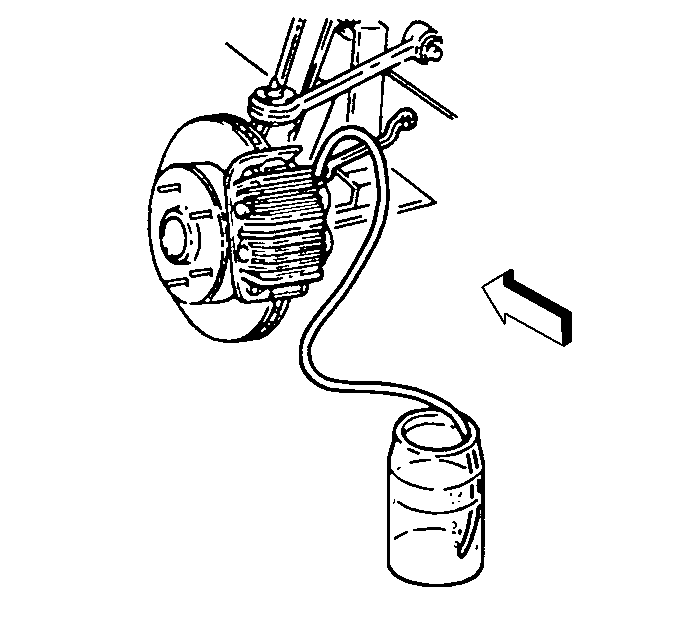Manual Bleeding Procedure
Tool Required
J 21472 Brake Bleeder
Wrench
Notice: When filling the master cylinder, use only Delco Supreme 11, GM P/N 12377967
(Canadian P/N 992667), or equivalent DOT 3 brake
fluid. Do not use a container which has been used for petroleum based fluids,
or a container which is wet with water. Petroleum based fluids will cause
swelling and distortion of rubber parts in the hydraulic brake system, and
water will mix with brake fluid, lowering the boiling point. Keep all fluid
containers capped to prevent contamination.
- Apply the brakes several times with the engine off to remove the
vacuum reserve.
- Use brake fluid to fill the master cylinder reservoir. Ensure
to keep the master cylinder reservoir at least half full during the bleeding
operation.
- Perform the following steps if the master cylinder is known or
suspected to have air in the bore:
| 3.1. | Disconnect the front Electronic Brake Traction Control Module
(EBTCM) pipe fitting at the master cylinder. |
| 3.2. | Allow the fluid to fill the master cylinder body bore until it
begins to flow from the front Electronic Brake Traction Control Module (EBTCM)
pipe fitting port. |
| 3.3. | Connect the front Electronic Brake Traction Control Module (EBTCM)
pipe to the master cylinder. |
| 3.4. | Tighten the Electronic Brake Traction Control Module (EBTCM) pipe
to the master cylinder. |
| 3.5. | Have a helper depress the brake pedal slowly one time and hold. |
| 3.6. | Loosen the front Electronic Brake Traction Control Module (EBTCM)
pipe fitting at the master cylinder body to purge the air from the bore. |
| 3.7. | Tighten the fitting. |
| 3.8. | Have the helper slowly release the brake pedal. |
| 3.10. | Repeat above sequence, including the 15 second wait, until
all the air removes from the brake master cylinder body bore. Ensure to prevent
fluid from contacting any painted surface. |
Tighten
Tighten the brake master cylinder pipe fitting to 16 N·m
(12 lb ft).
| 3.11. | Repeat the procedure outlined above to bleed the master cylinder
at the rear Electronic Brake Traction Control Module (EBTCM) fitting after
all the air is removed at the front Electronic Brake Traction Control
Module (EBTCM) pipe fitting. |
Tighten
Tighten the brake master cylinder pipe fitting to 16 N·m
(12 lb ft).

- Bleed the individual front
and/or rear brake calipers only after all the air is removed from the brake
master cylinder.
- Follow this sequence if it is necessary to bleed all of the front
and rear wheel brake calipers:
- Raise and suitably support the vehicle. Refer to
Lifting and Jacking the Vehicle
in General Information.
- Place a proper size box end wrench over the bleeder valve.
- Attach a clear tube over the front or the rear brake caliper bleeder
valve.
- Allow the tube to hang submerged in a clear container partially
filled with brake fluid.
- Have a helper depress the brake pedal slowly one time and hold.
- Loosen the bleeder valve to purge the air from the front or the
rear caliper.
- Tighten the front or the rear caliper bleeder valve.
- Have the helper slowly release the brake pedal.
- Wait 15 seconds.
- Repeat the sequence, including the 15 second wait, until
all the air removes. It may be necessary to repeat the sequence ten or more
times to remove all the air.
Tighten
Tighten the front or the rear brake caliper bleeder valve to 9 N·m
(80 lb in).
- Note that rapid pumping of the brake pedal pushes the master cylinder
secondary piston down the master cylinder body bore. This makes it difficult
to bleed the rear side of the system.
- Lower the vehicle.
- Fill the master cylinder reservoir to the proper level.
- Inspect for the following conditions:
| • | Check the brake pedal for sponginess. |
| • | Check the red BRAKE indicator lamp for indication of unbalanced
pressure. |
- Repeat the entire bleeding procedure to correct either of the
two above conditions.

